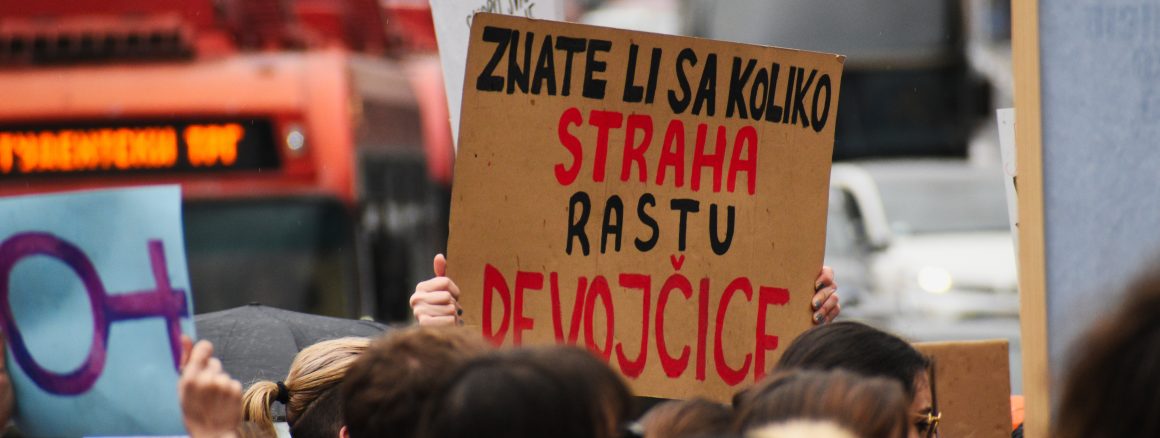LOOK ON THE RIGHT: “ANTI-GENDER” POLITICS AND HUMAN RIGHTS ISSUE IN THE WESTERN BALKANS
March 19, 2024
In 2015, a report by the Mediacenter Foundation found that ‘anti-gender’ politics was very much alive in Serbia, Croatia and Bosnia and Herzegovina, lobbying, organising mass protests or public referendums. Nine years on, it is still a major concern. ‘Anti-gender’ politics is one of the most powerful political options, mobilising citizens from different social and economic backgrounds, around different issues: from the protection of the environment, to the protection of human rights and the “natural” family.
How did this policy and its actors become so prominent?
There has been a great deal of very insightful academic analysis of this issue, and I strongly recommend that anyone who wants to write about it or learn more take a look at it. I would like to add a few observations that seem to me particularly important for understanding these politics outside the usual victimhood framework of “us” – the “progressives” – and “them” – the exclusionary camp. In reality, this division is much more blurred than it appears.
Most “anti-gender” organizations are part of what we call, “civil society”. They are legal entities, financed from international or local donors; professionally organized and capable of managing both high-level advocacy with institutions, or grass root mobilization with citizens.
“Anti-gender” politics and its actors are not some kind of crusaders against neoliberal hegemony; although they like to present themselves in that way. As Eva Fodor (2022) brilliantly presents in her book on anti-gender politics in Hungary, once these are incorporated into the official social policy agenda, “anti-gender” ideas became one of the pillars for implementing the neoliberal idea of reducing the social welfare state, whose mechanisms are transferred to the family, i.e. women.
Thus, social policies are focused on strengthening the “natural”, heterosexual family with “proper” national, religious background, so that it can take over the care that was once in the realm of the state. At the same time, “anti-gender” politics do not insist on the “housewife” and “breadwinner” family model. In free market states, everyone has to be employed; the difference is that women have double the burden. They have to work, and also take care of home, children, elderly, etc. with insufficient and conditional financial support from the state.
Finally, “anti-gender” politics do not undermine or negate human rights. On the contrary, their argumentation is quite often based on this idea, only their understanding of the term is more conservative and thus closer to their historical source.[1]
Freedom of expression and “anti-gender” politics
One of the most popular rights that “anti-gender” politics are eager to protect is freedom of expression. In that regard, we have interesting, current case of Mrs. Kristie Higgs in the UK. In 2018, Higgs posted on her social media profile a negative comment about sexual education programmes that included issues such as same sex relationships, and gender fluidity. Upon being reported by parents, the school worker was fired from her job. Nevertheless, she filed a complaint, claiming she was discriminated against based on her religious beliefs. The case is ongoing.
If Mrs. Higgs wins it, this would be a major victory for conservative, “anti-gender” politics, since their claim is that sanctioning “hate speech” only serves to the limiting of freedom of speech; that all those who disagree with the promotion of “LGBTQ ideology” are doomed to spend their lives in courts. As a member of the LGBTQ community, I would strongly disagree on the notion of “LGBTQ ideology”. But, I also disagree with the “progressive” insistence on politically correct speech, so that someone doesn’t get offended.
This case brings us back to the starting point: how do we define this very thin line between “hate speech” and “freedom of speech”? When do my rights become in conflict with the rights of others? Who determines these lines, borders to be crossed or not? Law and legal procedures are not always a good ally in these processes. And I am afraid that we are losing the importance of dialogue from our sights, especially with the ones who we perceive as “enemies”.
Thus, if we continue on solving the disputes through punishing people by firing them; publicly shaming or suing; this will only shut out the possibilities for people to understand diversity. And, it will certainly fuel the rise of anti-gender politics.
Author: Slobodanka Dekić, PhD in Sociology, Faculty of Philosophy, University in Belgrade
Editor in chief, www.diskriminacija.ba
Photo: Bum Realnost, Shutterstock
- For better understanding of the origins of human rights, history and what they fail to include, look at: David Harvey, A Brief History of Neoliberalism, Oxford University Press, 2005. Also, Barbara J. Keys, Reclaiming Americ
an Virtues. The Human Rights Revolution of the 1970s. Harvard University Press, 2014. ↩︎
